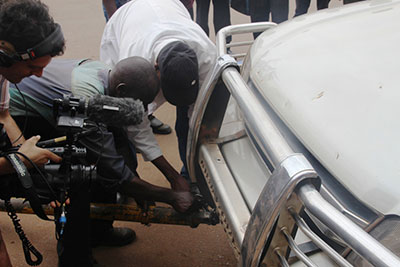Taylor Krauss, an American journalist, freelance filmmaker, and founder of the testimonial website Voices of Rwanda, traveled to Uganda roughly two weeks ago to conduct some filming in hopes of pitching footage later to various media outlets. Krauss is no stranger to the region; he has been traveling back and forth to the country for nine years. But now that he has been arrested, held for three days without charge, had his equipment confiscated, and finally forced out of the country, this probably marks his last visit. It probably also marks bad news for the press in Uganda.
On July 23, Krauss filmed opposition leader Kizza Besigye being acquitted of charges of incitement to violence in a courthouse in the capital, Kampala. Besigye, who has been arrested 34 times in the past five years, is accustomed to drawing such charges whether he is leading a political rally or simply walking down the street; his house is consistently surrounded by police and movements routinely checked. As he drove to the courthouse, supporters and onlookers began gathering around Besigye, Krauss told me: “First a few and then hundreds, and then hundreds more.” While the crowd was peaceful, jittery police started beating people with batons and firing teargas to disperse them. “In many ways it was the police who escalated things by closing down the road–it was not a political rally, Besigye had not organized anything,” Krauss said.
Since general elections in 2006, President Yoweri Museveni and his ruling party have faced mounting criticism and civil unrest over corruption and rising prices of basic commodities. Local journalists and news reports say the police have responded with increasingly harsh measures such as cracking down on protests, raiding activists’ homes, and even restricting the movement of Kampala’s mayor, an opposition politician. The next elections are scheduled in 2016.
As Krauss filmed the police last week, police grabbed him, took his equipment, deleted his footage, and sprained his hand as they pulled him into Central Police Station for interrogation, he said. Over the next three days, Krauss was held without charge–even though it is illegal to detain someone without charge in Uganda for more than 48 hours–and repeatedly interrogated at Jinja Road Police Station, he said. On the third day, police ransacked his hotel room searching for anything incriminating, even tearing the lining of his suitcase, Krauss found out once finally released.
His crime? Working illegally without journalist accreditation or work permit, the director of the government’s press department, Ofwono Opondo, told CPJ. Taylor had entered Uganda with a tourist visa. Police took him on July 24 to the immigration department, where the head of immigration ordered his release, Krauss said. But the police continued to hold him until he was finally escorted out of the country on Friday night, July 26. While the independent filmmaker was not officially deported, the government said it prepared “an organized departure,” according to news reports.
His ordeal does not bode well for future independent coverage of Uganda. “If an American gets imprisoned, you can imagine the fear local journalists have to report freely, even the international press may be cowed from covering opposition from now on,” Krauss said. According to the Foreign Correspondents’ Association of Uganda, the last time an international reporter was detained more than briefly was five years ago.
Several local journalists told me that whenever they cover the opposition, authorities automatically view them as opposition supporters. “In 2011 while covering the walk-to-work protests, I had to stop my coverage due to the threats and accusations,” one local journalist, who asked not to be identified for fear of retaliation, told me. “Reporters are routinely demonized for covering Besigye, whether they support his policies or not.”
Local journalists also said that covering the opposition is unlikely to be any easier under the new minister for internal affairs, former defense chief Gen. Aronda Nyakairima. Krauss’s “organized departure” came days after Gen. Nyakairima publicly warned at his inauguration that he would enforce stricter regulations to crack down on “unprofessional” media practitioners, according to news reports. He also thanked another military appointee, Inspector General of Police Gen. Kale Kayihura, “for cracking down on protesters,” the reports said.
